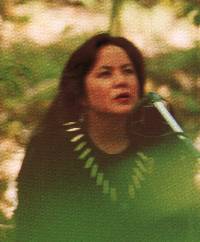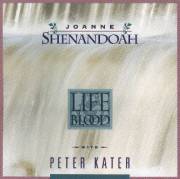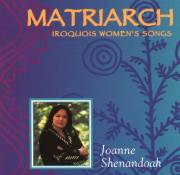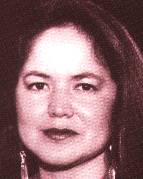 To
speak about Joanne Shenandoah
is no doubt to speak about the most celebrated Native American singer ever. Not often is a
voice capable of joining tradition, culture and music with such harmony as hers.
To
speak about Joanne Shenandoah
is no doubt to speak about the most celebrated Native American singer ever. Not often is a
voice capable of joining tradition, culture and music with such harmony as hers.JOANNE SHENANDOAH
V-I-T-A-L M-U-S-I-C
By: M.M.
 To
speak about Joanne Shenandoah
is no doubt to speak about the most celebrated Native American singer ever. Not often is a
voice capable of joining tradition, culture and music with such harmony as hers.
To
speak about Joanne Shenandoah
is no doubt to speak about the most celebrated Native American singer ever. Not often is a
voice capable of joining tradition, culture and music with such harmony as hers.
Having been labelled by some as the Enya of the Native American people, she is much more than that. Her personality and artistic talent, her crystaline voice, go far beyond any comparison. This singer intertwines delicacy, tenderness and feminity, together with the melodic wealth of Iroquois tradition.
Joanne belongs to the Wolf Clan of the Oneida nation, in the Iroquois Federation, a territory found in the center of the state of New York. She grew up in an environment of a profound love for music. Her father was a jazz guitarist, and he and her mother prompted her to study flute, piano, clarinet, guitar, cello and singing. The latter would be the one aspect she would excel at very soon indeed, thanks to the great sensitivity she has when singing the ancient Iroquois songs.
Yet the artist went beyond that, introducing in her classical repertoire not only traditional instruments but also contemporary instruments as well. Throughout her career she has collaborated with different American and European musicians, drinking from the sources of all of them.
 Thus it has been how she has created her own style,
beautiful, nearer to the emotions than to the material aspects of life. In her latest
stage we have got to know her better with her works in the label Silver Wave
Records, such as Life Blood,
together with extraordinary musician Peter Kater at the piano, or Matriarch, which have left a deep imprint
in the popularization of the Native American traditional songs.
Thus it has been how she has created her own style,
beautiful, nearer to the emotions than to the material aspects of life. In her latest
stage we have got to know her better with her works in the label Silver Wave
Records, such as Life Blood,
together with extraordinary musician Peter Kater at the piano, or Matriarch, which have left a deep imprint
in the popularization of the Native American traditional songs.
In Life Blood (1995) we will find ancient melodies with completely updated arrangements. This work is an Iroquois song to nature (hence its title), the vital sap that moves everything. Themes devoted to animals, songs of friendship, homages to woman as creator of life, dances in honor of thunder..., are interwoven with utmost delicacy, always wrapped up into Shenandoah's sensitive vocals.
The artist believes herself fortunate to possess such a wealthy Iroquois heritage. Her contribution to the defense of the cultural integrity of her people consists in the performance of these so very ancient songs, as well as the keeping of Round Dance Productions, a non-profit foundation to preserve this culture. In the future, Joanne wants to open some files that store the entire musical tradition of her tribe, as well as an artistic center and a recording studio.
 Pianist
and keyboardist Peter Kater, widely known for his solo career as well as
his work with other native musicians like R. Carlos Nakai, met Shenandoah
at a time when he was commissioned to compose the music for an episode of the TV series How
the West was Lost, for The Discovery Channel. This episode, devoted
to the Iroquois people, counted with Joanne's participation, and both
musicians collaborated to give rise to a series of traditional melodies performed in a
totally new way. From this positive experience a fruitful collaboration was born, which
can be appreciated in "Life Blood". In this album, both of them try to make us
see that the Earth is us and that we are like the others.
Pianist
and keyboardist Peter Kater, widely known for his solo career as well as
his work with other native musicians like R. Carlos Nakai, met Shenandoah
at a time when he was commissioned to compose the music for an episode of the TV series How
the West was Lost, for The Discovery Channel. This episode, devoted
to the Iroquois people, counted with Joanne's participation, and both
musicians collaborated to give rise to a series of traditional melodies performed in a
totally new way. From this positive experience a fruitful collaboration was born, which
can be appreciated in "Life Blood". In this album, both of them try to make us
see that the Earth is us and that we are like the others.
In Matriarch (1996) we attend a selection of traditional songs of the Iroquois woman. The album is in actual fact a homage to "Lifegivers", to the woman who takes care of her family and sees it grow despite the difficulties.
These are themes extracted from the popular cultural tradition of the Haudenosaunee, an Iroquois tribe that composed them further back in ancient times than what memory allows to remember, in honor of their women and in general to all those capable of begetting new life. The respect for their women is one of the high points of this tribe, where the family and the intimate circle that it composes are one of the main supports to continue forward despite the problems. Actually, it is the women the ones who lead a great deal of tribal activity.
 This album, more
rhythmic and traditional than Life Blood, has been co-produced by Tom
Wasinger, who has contributed to creating in it an intimate, cordial atmosphere.
To make it, both musicians travelled through the Oneida territory, visiting ancient native
American settlements. The titles of the songs, on the other hand, reflect a firm intention
on the part of Joanne's to emphasize the great wealth and personality of
the female soul. Each one of them is called after a female member of her own family..
This album, more
rhythmic and traditional than Life Blood, has been co-produced by Tom
Wasinger, who has contributed to creating in it an intimate, cordial atmosphere.
To make it, both musicians travelled through the Oneida territory, visiting ancient native
American settlements. The titles of the songs, on the other hand, reflect a firm intention
on the part of Joanne's to emphasize the great wealth and personality of
the female soul. Each one of them is called after a female member of her own family..
In her daily fight to preserve the Iroquois culture, Shenandoah has participated in different important festivals, contributing a great visibility to this kind of music. She has done so, for instance, in Woodstock '94, Earth Day '95 and in the 1995 Special Olympics. She has also given private performances to the First Lady Hillary Clinton and to Ms. Tipper Gore. She was nominated Native Musican of the Year 1993, Native American Woman of Hope 1996 and received the Native American Woman's Recognition Award 1996.
Her musical activities have likewise reached the television, as we have already mentioned, participatimg in several soundtracks for TV series, specially in Northern Exposure.
Joanne Shenandoah's tribal name, Tekalihwa khwa, summarizes the essence of this artist: "She Sings".